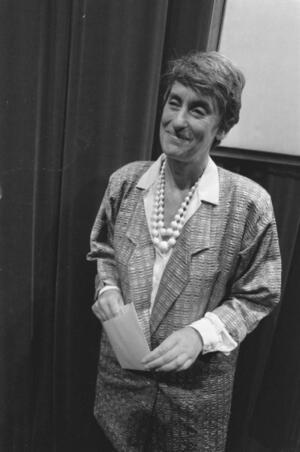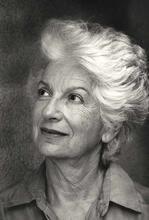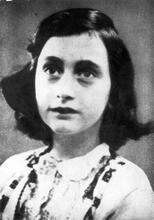Judith Herzberg
Photo of poet Judith Herzberg in 1988 by Rob Bogaerts, courtesy of Wikimedia Commons.
Only five years old when the Nazis invaded Amsterdam in 1940, Judith Herzberg spent the next five years of her childhood passing from one Christian family to another. After the war, her parents were released from Bergen-Belsen and returned to Amsterdam to reclaim her. Herzberg began publishing poetry in the weekly paper Vrij Nederland in 1961 and her first collection, Zeepost, appeared in 1963. As of 2017 she had published sixteen collections of poetry, several books of essays, and numerous plays and teleplays, the most famous of which was Leedvermaak (1997), which has been translated into several languages and turned into a film. Among her many honors, she received the Constantjin Huygens Prize in 1994 and the PC Hooft Prize in 1997.
Judith Herzberg has created an extensive body of work during the several decades that she has been active. She has written poems, essays, plays, film scripts, and television dramas, and has many translations and adaptations to her name. She made her debut as a poet at the beginning of the 1960s. During the 1970s she began to write for the stage, stimulated by the Institute for Theater Research of Nederland.
Early Life and Family
“In my memory sticks a horrible story, of which I would be ashamed if it turned out not to have happened, because it would then mean that I imagined it.” With these words Judith Herzberg begins an autobiographical story, which appeared in 1992 and deals with something that happened when she was ten years old.
Judith Herzberg was born in Amsterdam on November 4, 1934, the daughter of lawyer, historian, and writer Abel Jacob Herzberg (b. Amsterdam, 1893–1989), who from 1934 until 1936 was chairman of the Dutch Zionist Organization, and Thea Herzberg-Loeb (b. The Hague, 1889–1991). After the Germans invaded the Netherlands in May 1940, the parents lived in various hiding places until January 1944, when they were interned in the Bergen-Belsen concentration camp. They survived and were liberated by the British army on April 15, 1945. Throughout that time Judith was handed over to different Dutch families, living in various villages under false names. Her siblings, Abraham Michael (b. 1924) and Esther Elisabeth (b. 1926), were also in hiding with various Dutch Christian families. After the war they both emigrated to Israel. Thea Herzberg was active in Help the Children, a guardianship committee established by the Jewish community to rescue the Jewish orphans who had been placed with Dutch Christian families who refused to relinquish them.
Married and divorced, Judith Herzberg has a son and daughter, both living in the Netherlands.
Education and Poetry Writings
Judith Herzberg attended the Montessori Lyceum in Amsterdam, specialized in languages and humanities, and never attended a university except to teach at the Leiden University in the 1990s and at the Amsterdam Film School from 1980 to 1997 (script writing), as well as at the Sam Spiegel Film School in Jerusalem from 1990 to 1994 (script writing).
Although the war may well have played a decisive part in forming her sensitivity, Herzberg herself never makes this claim. She was old enough to have a conscious awareness of the terrible period that came to an end in 1945, old enough to know that her parents were not where she had a right to expect them to be, but there is no hint in her poetry of an exploitation of this subject. The war is present in a few poignant poems, a memory of rejoining her mother, who had become a stranger.
Reunion
For years I had not seen such a town
Or stood at the bottom of such stairs
As on that hot day, in black Sunday best
And leather shoes. And at the top
I saw vaguely my strange mother
I’d have to give her a kiss.Soft cuddling that night after night
I’d pretended to creep from
The war into sleep
Was dividing us now. Too grown-up,
Too skinny and countrified, I took
It all back. Was this
Really my mother?Come up, she said,
Winking to put me at ease,
But with both eyes at once.
Right then I thought we should say
The goodbyes we’d delayed,
But I didn’t know how to look at her
With my difficult eyes.
(Translated by Shirley Kaufman and Judith Herzberg)
Boxes
Because all through the war we always heard
About before the war and how naïve
They were, I am very careful now.
If I throw out something, for instance
A carton, I hope
That box will never catch up
With me in the shape of blame:
Just think how innocent,
To throw out boxes,
If only we’d kept one,
Kept only one!
(Translated by Shirley Kaufman and Judith Herzberg)
In the words of critic Henk Romijn Meijer, the tangible world of Herzberg’s poetry reveals “her desire to capture the most fleeting, the briefest of moments … [and] the scrupulous attention to physical detail, bring a toughness of form and language … no matter how elusive the subject.”
Playwriting and Awards
In the early 1970s, after publishing five successful collections of poetry, Herzberg began writing for the stage, steadily building up a vast body of work. One of the most important Dutch playwrights and poets of our time, she has received several major awards, including the Constantjin Huygens Prize in 1994 for her entire literary oeuvre and the prestigious P. C. Hooft Prize in 1997 for her poetry. Her work is marked by a precise style and a clear look at humans and their behavior. Another characteristic of her work is her position as the observer, the outsider. Commenting on this, she says: “I want to avoid any moralistic statements in my plays. What I am attempting is to allow the audience to experience the same confusion that I experience when I observe reality.”
Her poetry has been translated into English and German. Her dramatic work has been translated into German, English, French, Italian, Portuguese, and Hebrew.
One of her later plays, Leedvermaak (The Wedding Party, 1997), which established her reputation, has until now been the one most performed internationally. Staged several times in Germany and Austria, it also made an enormous contribution to the Dutch awareness of the war, and more specifically to the fate of the Jews and the long-lasting traumas to which they were subjected. Herzberg’s collaboration with the directors of her works resulted in a theater that was neither psychological nor rooted in the tradition of the well-made play. Without borrowing from the nineteenth-century theater tradition, she succeeds in putting on stage people who are alive, emotionally moving, funny and recognizable. Herzberg’s plays sometimes seem witty, but in her writing wittiness is never an end in itself; a comedy is always also a tragedy. Behind the comedy, awful reality always lurks. Reality is disguised, but not by great degrees of love and kindness. It is enfolded by charm, good manners, politeness, empathy—in short, denial.
Awards
Bavarian Film Prize, 1980.
Jan Campert Prize for the stage, 1980.
Jan Campert Prize for poetry, 1981.
Critic’s Prize for Leedvermaak (The Wedding Party), 1982.
Joost van den Vondel Prize for her whole oeuvre, 1983.
Cestoda Prize, 1988.
Charlotte Koehler Prize for Leedvermaak, 1988.
Dutch/Flemish Playwrights Prize for Kras (Scratch), 1989.
Selected Works
Drama (In Dutch)
De deur stand open (The Door Stood Open, 1972).
Dat het’s ochtends ochtend wardt (That Day May Dawn, 1973).
Het is geenhond (It is not a dog, 1973).
Lieve Arthur (1976) Television play.
Crankybox (1976) Television play.
Eenakter (1976).
Charlotte (1980) Film scenario.
De val van Icarus (The Fall of Icarus, 1979).
Leedvermaak (The Wedding Party, 1982).
De vrouwen van Troje (The Trojan Women, 1983) after Euripides. Adaptation with Wim van Lakwijk.
Dibboek (The Dybbuk, 1984) after Solomon Anski with Mira Rafalowicz.
En/Of (And/Or, 1985).
De kleine Zeemeermin (The little mermaid, 1986) after Hans-Christian Andersen, Libretto.
Merg (Marrow, 1986) Libretto.
Uit den vreemde (From an Alien Land, 1987) after Ernst Jandl.
De Caracal (The Caracal, 1987) Monologue.
Kras (Scratch, 1988); En goed hoffd (A good head, 1991).
Some of my best friends (1994).
Rijgdraad (Tacking thread, 1995).
De Nietsfabriek (The nothing factory, 1997).
Een golem (A Golem,1998).
Wie is van wie (Who belongs to whom, 1999).
Simon (2002).
Weg is weg (The way is a way, 2002).
De zomer van Aviya (The Summer of Aviya, 1992) after Gila Almagor. Adaptation for the Young People’s Theater, with Pauline Mol.
And Everybody Believes in It. With introduction by Ruby Engelander. Nederland: 2001.
Translated Dramatic Works in English
That Day May Dawn.
“The Wedding Party (Leedvermaak)” In Dutch and Flemish Plays. London: 1997.
And/Or.
“The Caracal (De Caracal).” In A Touch of the Dutch. Plays by Women. London: 1997.
“Scratch (Kras)” Theatre in Translation. Amsterdam: 1995.
Poems (in Dutch)
Zeeport (Sea mail, meaning by slow boat, 1963).
Beemdgras (Fieldgrass, 1968).
Stryklicht (Edgelight, 1971).
Botshol (small lake near Amsterdam, 1980).
Dagrest (Remains of the Day,1984).
Zo als (Just like,1992).
Wat zij wilde schelderen (What she means to paint, 1996).
Byvangst (A fishery term: an unintended catch, 1999).
Staalkaart (Sample sheet, 2001).
Translated Poems in English
Herzberg, Judith. But What: Selected Poems. Introduction by Henk Romjin Meijer. Oberlin, Ohio: 1988.





